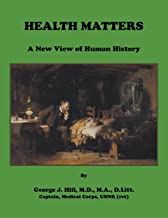 Founded in 1980 |
|
|
George J. Hill, Health Matters: A New View of Human History Berwyn Heights, Maryland, Heritage Books, 2021 ISBN 978-1556136818 |
Reviewer: Alan Lippman / May 29, 2022
Gustav Mahler, the late 19th-early 20th century German composer/conductor, reportedly said: “A symphony must be like the world. It must contain everything.” If that is the case, then George Hill’s new work, Health Matters, could be construed a literary symphony.
Hill postulates that the human condition is governed by the quest for good health and a long life and that the pursuit of health is marked by avoidance of illness, appropriate treatment of diseases and injuries, and postponement of death, to the extent achievable. The basis for these objectives and its motivating nature, Hill claims, is human awareness of the existence of a future. The author factors the components of health to include the “haves’ (the body, the mind, and the environment), the “needs” (air and breath, sun and light, and sleep and dreams), the “urges” (water, food, shelter, social connections, clothing, and fire), and the “wants” (love and money). He further expounds on the complex relationships between and among these components and provides copious illustrations of how, through history, these needs are met and how they contribute to the human condition.
What marks this book as a “literary symphony” is the vast quantity of historical detail Hill employs to illustrate the rationale for his worldview. Here is a virtual encyclopedia of human civilization and endeavor, examined from the perspective of health and leading ultimately to the development of today’s health care “industry.” This material is further supplemented by an extensive historiography. Structurally, this 322-page book is arranged in three major sections, each containing multiple chapters, an extensive bibliography, 640 “notes,” five Appendices and a 15-page index. An accurate adjective would describe this book as a “tome.”
Those familiar with Hill’s previous literary output, which includes multiple books on science, medicine, and medical history, will recognize his penchant for detail, thoroughness, and accuracy. While other of his works with which I’m familiar (Edison’s Environment, Proceed to Peshawar, and Rolling with Patton), are easier to read, this one could perhaps be considered by some to be a bit overwhelming. But, if anything else, it is surely thought-provoking and raises in one’s mind fundamental concerns about current challenges, including climate change, access to equitable health care, the role of individual motivation and personal choice, and the responsibility of the medical profession to address global matters of public health.
Alan J. Lippman, MD
May 29, 2022
